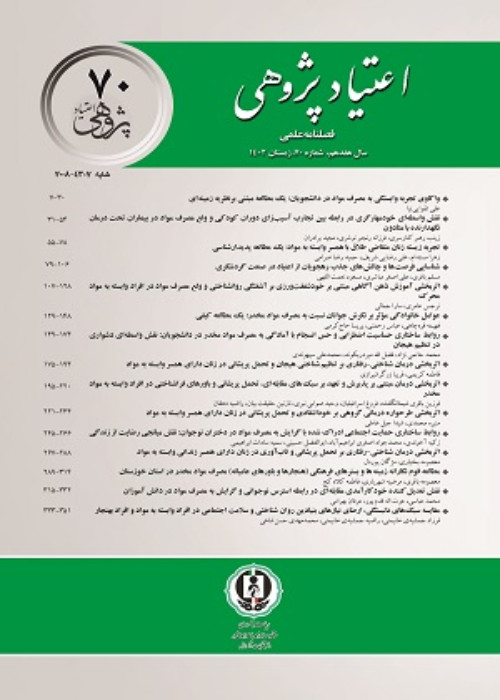Inefficiency Analysis of Prevention Programs: Qualitative Research
Author(s):
M Niazi , M Noruzi , E Sharifi , R Khoramian
Article Type:
Research/Original Article (دارای رتبه معتبر)
Abstract:
Objective
Drug trafficking is one of the most significant social damage that can easily undermine the cultural and social base of a country and its human dynamism. The confluence of the psychological, social, economic, political and cultural factors has made this one of the most complex social damages of recent decades in the country. Accordingly, the adoption of programs with the prevention and empowerment approach to addiction has always been the focus of attention. However, preventive programs have not been successful at many levels. In this regard, the aim of this study was to analyze the inefficiency of prevention programs.
Method
The present study was carried out with a qualitative approach and through grounded theory. The data were collected through a deep interview with 33 consumers living in Ghaleh Shour camp of Isfahan as well as managers, experts, and therapists in the area of addiction in spring of 2016. These sample units had been selected via purposive sampling and the theoretical saturation criterion. The data were then analyzed using axial coding.
Results
Axial coding led to the production of 14 categories and 66 sub-categories, which illustrate the causal and underlying conditions, strategies, and consequences of the inefficiency of prevention programs from the perspective of both groups of participants in the research. Some of these categories include non-cooperative policies, inappropriate bureaucracy, cadre-oriented and actor-oriented cultural constraints, customization, and obdurate anarchy.
Conclusion
From the perspective of both groups of participants, there is a dual typology of weaknesses and deficiencies in the preparation, development, and implementation of prevention plans, which, in turn, shows the content and formal denial of plans. In the first type of the strategy, obdurate anarchy is adopted by interviewees and, in the second type of the strategy, customization and acceptance of failure in dealing with this phenomenon are adopted by the interviewees where such consequences as empiricism, friendship, and escape and insignificant access to plans come into existenceKeywords:
Language:
Persian
Published:
Research on Addiction, Volume:12 Issue: 47, 2018
Pages:
73 to 92
magiran.com/p1909798
دانلود و مطالعه متن این مقاله با یکی از روشهای زیر امکان پذیر است:
اشتراک شخصی
با عضویت و پرداخت آنلاین حق اشتراک یکساله به مبلغ 1,390,000ريال میتوانید 70 عنوان مطلب دانلود کنید!
اشتراک سازمانی
به کتابخانه دانشگاه یا محل کار خود پیشنهاد کنید تا اشتراک سازمانی این پایگاه را برای دسترسی نامحدود همه کاربران به متن مطالب تهیه نمایند!
توجه!
- حق عضویت دریافتی صرف حمایت از نشریات عضو و نگهداری، تکمیل و توسعه مگیران میشود.
- پرداخت حق اشتراک و دانلود مقالات اجازه بازنشر آن در سایر رسانههای چاپی و دیجیتال را به کاربر نمیدهد.
In order to view content subscription is required
Personal subscription
Subscribe magiran.com for 70 € euros via PayPal and download 70 articles during a year.
Organization subscription
Please contact us to subscribe your university or library for unlimited access!


